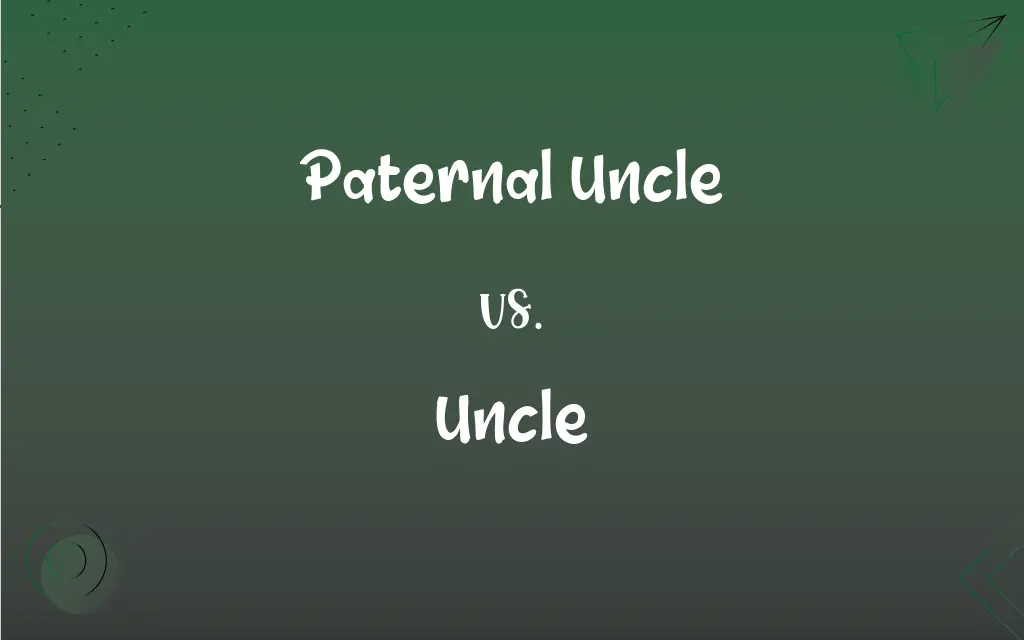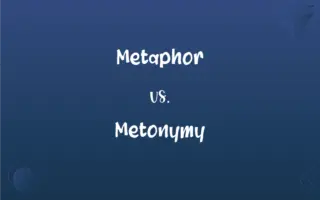Paternal Uncle vs. Uncle: What's the Difference?
Edited by Aimie Carlson || By Harlon Moss || Published on November 25, 2023
Paternal Uncle refers to the brother of one's father. Uncle refers to the brother of one's parent or one's parent's brother-in-law.

Key Differences
A paternal uncle specifically refers to the brother of one's father. This term is used to clearly indicate the side of the family (father’s side) from which the uncle is related. For example, "My paternal uncle is an avid gardener," highlights that the uncle is related through the father’s lineage.
Uncle, in a broader sense, can refer to the brother of either one's mother or father. It can also refer to the husband of one's aunt. For instance, saying, "My uncle gave me a book for my birthday," does not specify which side of the family the uncle is from.
Paternal uncle is a more precise term. It specifically identifies the familial connection, leaving no ambiguity about which side of the family he belongs to. This term is particularly useful in cultures and conversations where distinguishing family lineage is important.
Uncle, without any qualifiers, offers a more general reference. It is commonly used when the specific side of the family is not relevant to the context or when the speaker assumes the listener knows which side of the family is being referred to.
Paternal uncle is often used in contexts where family lineage, inheritance, or ancestral stories are involved. In such cases, knowing the exact familial line can be significant. For example, "My paternal uncle shared stories of our grandfather’s adventures."
ADVERTISEMENT
Uncle serves as a more casual or universal term. It's used in everyday language where the precise lineage is not crucial. For example, "I went fishing with my uncle," conveys a familial relationship without specifying the family line.
Comparison Chart
Specificity
Specifically the brother of one's father.
Can be the brother of either parent.
Familial Side
Always from the father's side.
Can be from either the mother's or father's side.
Cultural Context
Often important in lineage-focused cultures.
Used universally without lineage emphasis.
Relationship
Direct blood relation to father.
Blood relation or through marriage.
ADVERTISEMENT
Usage in Conversation
Used when specifying paternal lineage.
Used when lineage specification isn't necessary.
Paternal Uncle and Uncle Definitions
Paternal Uncle
Male sibling of one’s father.
Our paternal uncle visited us last summer.
Uncle
Brother of one’s parent.
My uncle is coming for dinner.
Paternal Uncle
Father’s brother.
My paternal uncle is a pilot.
Uncle
Male relative from parent’s side.
My uncle is an artist.
Paternal Uncle
Father’s male sibling.
Our paternal uncle is a historian.
Uncle
Sibling of one’s mother or father.
Our uncle is visiting from Australia.
Paternal Uncle
Brother on father’s side.
My paternal uncle lives abroad.
Uncle
Parent’s male sibling.
Our uncle used to tell great stories.
Paternal Uncle
Dad’s brother.
My paternal uncle taught me how to fish.
Uncle
Parent’s brother or brother-in-law.
My uncle helped me fix the car.
Uncle
The brother of one's mother or father.
Uncle
The husband of a sibling of one's mother or father.
FAQs
Can uncle be used for both maternal and paternal relatives?
Yes, uncle can refer to a male relative from either side.
Is a paternal uncle always related by blood?
Yes, a paternal uncle is always the biological brother of one’s father.
Are paternal uncles always on the father's side?
Yes, paternal uncles are exclusively from the father's side.
Can uncle refer to a non-biological relative?
Yes, uncle can refer to a parent's brother-in-law.
Are paternal uncles considered immediate family?
Yes, paternal uncles are generally considered part of the immediate family.
Is it necessary to specify 'paternal' in conversations?
Not always, but it clarifies that the uncle is from the father’s side.
Does uncle always imply a close relationship?
Not necessarily, it can be used for distant relatives as well.
Can paternal uncle refer to multiple people?
Yes, it can refer to all of one’s father’s brothers.
Can uncle mean the husband of one’s aunt?
Yes, uncle can refer to an aunt’s husband.
Are paternal uncles important in genealogy?
Yes, they can be significant in tracing family lineage.
Is paternal uncle a universal term?
It’s universally understood but more commonly used in certain cultures.
Can uncle be used in formal documentation?
Yes, uncle can be used in formal and informal contexts.
Do paternal uncles have specific roles in some cultures?
Yes, in some cultures, paternal uncles have special familial responsibilities.
Is it correct to call a great-uncle 'uncle'?
Yes, great-uncles are often colloquially called uncles.
Is paternal uncle used in legal contexts?
Yes, especially in matters of lineage or inheritance.
Can uncle be a term of endearment?
Yes, it can be used affectionately.
Can uncle refer to an older male friend?
Yes, sometimes it's used for older male friends or acquaintances.
Does uncle always mean a close bond?
Not always, it denotes a familial connection which may or may not be close.
Can the term uncle be used affectionately for a family friend?
Yes, uncle can be used affectionately for close family friends.
Is it common to have more than one paternal uncle?
Yes, if one’s father has multiple brothers.
About Author
Written by
Harlon MossHarlon is a seasoned quality moderator and accomplished content writer for Difference Wiki. An alumnus of the prestigious University of California, he earned his degree in Computer Science. Leveraging his academic background, Harlon brings a meticulous and informed perspective to his work, ensuring content accuracy and excellence.
Edited by
Aimie CarlsonAimie Carlson, holding a master's degree in English literature, is a fervent English language enthusiast. She lends her writing talents to Difference Wiki, a prominent website that specializes in comparisons, offering readers insightful analyses that both captivate and inform.






































































